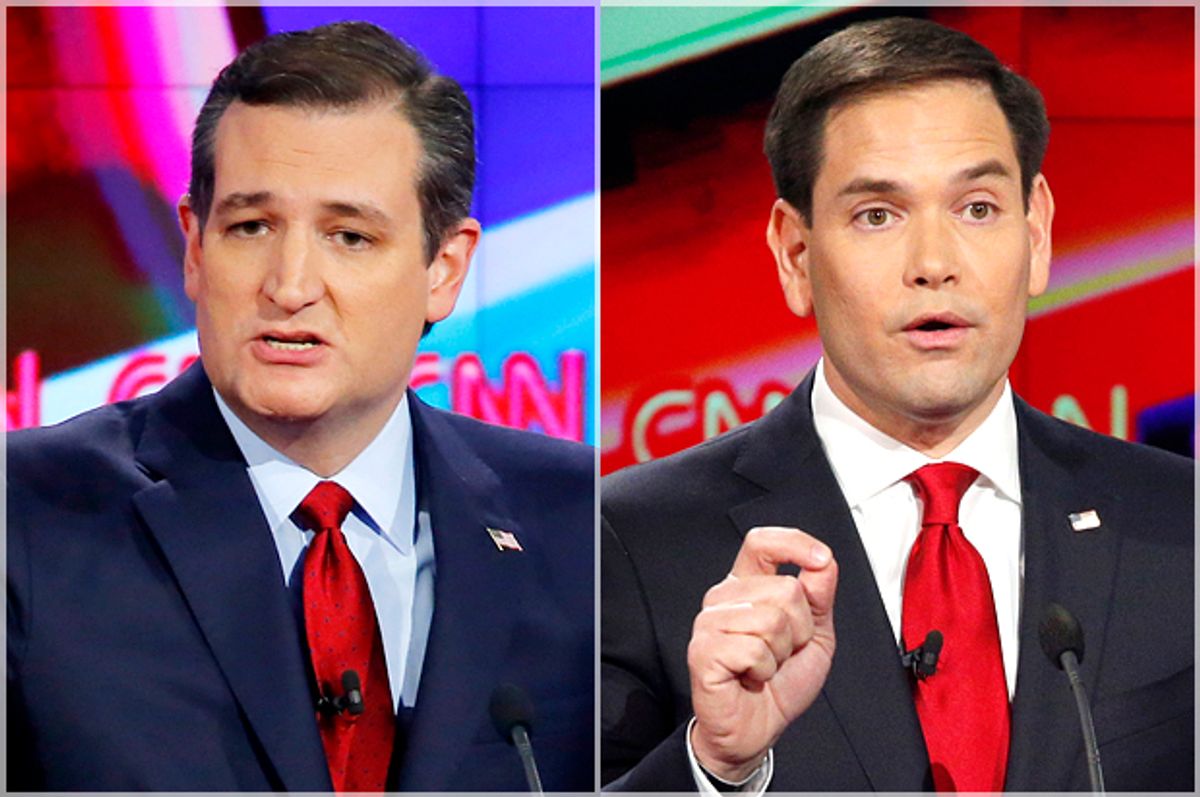While National Review's Jim Geraghty described Tuesday night's debate as a showcase for the Republican presidential candidates' "real knowledge and critical analysis of serious crises," for those who didn't spend late-2012 worrying about skewed polls, the takeaway was different. Instead of a bunch of "serious" people offering "analysis" of various "crises," they saw a gaggle of thirsty politicians who were doing everything they could to ride a wave of fear into the Oval Office.
Fear of what, exactly? In this case, the bogeyman was ISIS (a "greater, more varied, more sophisticated threat" than al Qaeda, according to Geraghty). But if you've been paying attention to conservative politics in the Obama era, you know that the mix of anger and anxiety that characterized last night's debate was the prevailing mood within the GOP long before anyone in the U.S. had ever heard of the Islamic State. The lyrics may vary — substitute "radical Islam" for "death panels" or "socialism" — but, fundamentally, the song remains the same.
Even if that's true, though, it's not so much an answer as it is a bridge to another question: Where is this fear coming from? Yes, the threat posed by ISIS in particular, and the bloody instability of the Middle East in general, is real and scary. But nothing ISIS has done can compare to the Madrid train bombings of 2004 or the London bombings of 2005, to say nothing of 9/11. As horrifying as the recent atrocity in San Bernardino was, it was also the kind of mass shooting to which Americans are becoming increasingly inured. The "crises" of the present moment, in other words, are nothing new.
If you wanted, you could reasonably argue that this is nothing more than the routine partisanship and polarization of U.S. politics. A Republican was in the White House during those earlier years of tumult and uncertainty, so Republican voters felt assured that their commander-in-chief would protect them (even if he already failed, spectacularly, to do just that). Now that a Democrat resides at 1600 Pennsylvania Avenue, Republican voters aren't so sure. If a GOPer wins the White House in 2016, these same voters will once again find themselves feeling comparatively serene.
You could make that argument, and you'd have some firm ground to stand on. But while you wouldn't be wrong, per se, I don't think you'd be entirely right. Because while Barack Obama may be a typical Democrat when it comes to policy, he is quite obviously an unprecedented figure in nearly every other respect. More than that, for the many Republican voters who see the Reaganite 1980s as the last time America was as God intended, the fact that a guy like Obama — African-American, cosmopolitan, intellectual, pluralist, and relatively secular — could win the White House twice is profoundly unsettling.
So rather than point to 9/11 as the inaugural moment of our politics of fear, as the New Republic's Jeet Heer does, I'd point to Obama's ascendance (and his endurance) as its ultimate cause. For the Republican coalition, which is older and whiter than its Democratic counterpart, Obama's success represents something that's not only new, but which also threatens to negate some of their most fiercely held beliefs about what America fundamentally is. And, really, that's just another way to say that his victories contradict how America — which, to them, is effectively "the world" — is supposed to work.
It's no wonder, then, that they're so irresistibly drawn to an apocalyptic narrative of decline and destruction. Because the world as they knew it (and as they liked it) truly is coming to an end. That's the psychological landscape any Republican running for president must traverse this election. As far as their party's most dedicated supporters are concerned, the world is already over, and every piece of bad news just makes it that much more apparent. These are scary times for Republicans electorate; it'll be a long, long time before this politics of fear comes to an end.


Shares